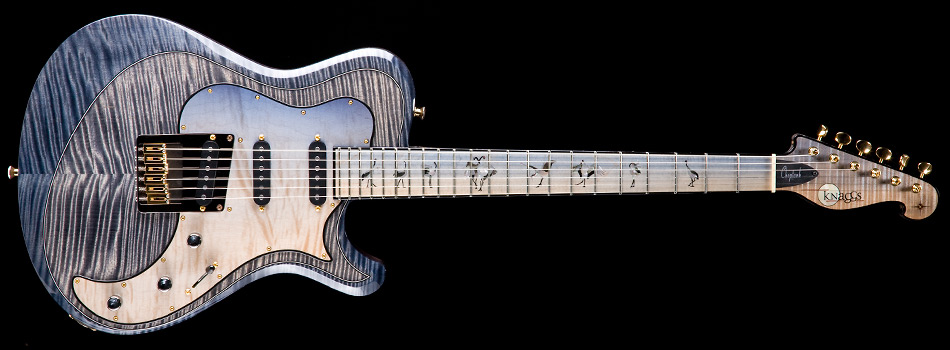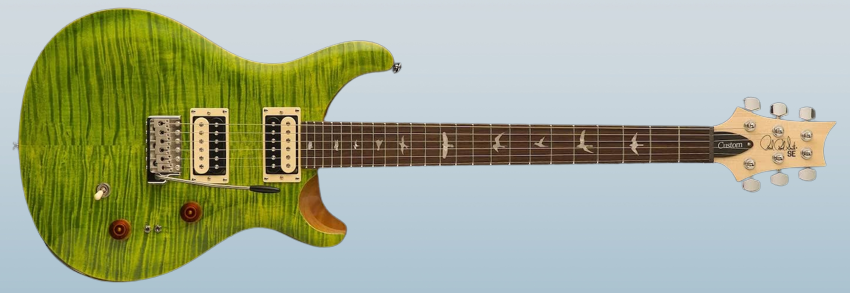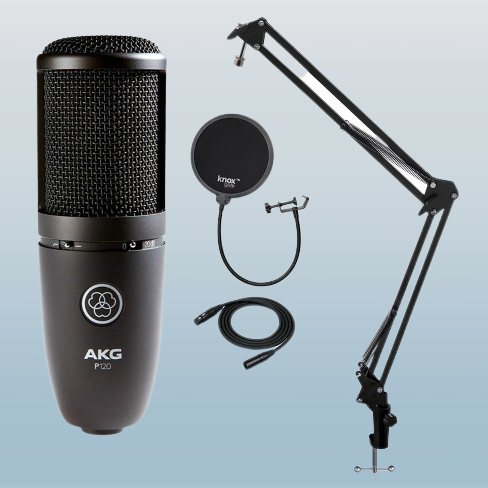Over the past decade, and especially over the past 5 years, sales of boutique electric guitars have enjoyed a phenomenal rise and small-operation builders sprang up in droves. These builders offer new designs and innovations, bespoke craftsmanship, and their spin on the tried and true classics. In this article, I’ll discuss how these guitars differ from their mass produced counterparts and why you should consider a boutique guitar the next time you buy.
Until a few years ago, guitar stores across America hung mostly the established brands on their walls. Today, in smaller independent stores, it’s common to find hand crafted guitars made by boutique builders in place of those historic brands. More retailers are offering boutique guitars as a way to differentiate themselves, improve profitability, and decrease the working capital investment required to carry the established brands (major manufacturers employ a “pay-to-play” model). Forcing them to accept terms, pricing, and SKU’s dictated by large manufacturers and wholesalers, independent retailers are choosing instead to offer unique, high quality boutique guitars to their customers who demand excellence, service, and performance.

Boutique Guitar Exchange, an established independent retailer owned by Matthew Chenoweth and located in the trendy Poncey-Highlands neighborhood in East Atlanta, is an example of the new retail model. There, you’ll find guitars built by Matt Eady, Tom Anderson, James Tyler, Suhr, Nikita, TMG, and Nik Huber, while the amp room boasts creations by Magnatone, ToneVille, Divided By 13, Redplate, Lockard, and Panama. These are hardly the names you’ll find in the big box stores, who continue to aligned themselves with the major manufacturers. With investors to satisfy, the national chains seek the comfort and safety of familiar brands. “The simple truth is music industry retail stores are slow to adapt and stuck in the past, often anchoring themselves to brands less because of their current value and more due to their historical significance,” says Gabriel O’Brien in a recent article he wrote entitled “Why We Fired Fender.” The big box model has become stale, predictable, and boring. On the other hand, Boutique Guitar Exchange, who couples a traditional brick and mortar location with online sales, is an exciting place to visit because of the ever-changing selection of unique guitars. According to Mr. Chenoweth, “During the first 10 years of the shops existence, it was hard to get people to trust the boutique brands. It’s better today, since they recognize the superior quality of smaller builders.”
For every boutique builder who has broken the retail barrier, there are dozens and dozens more who sell through non-traditional channels and who custom build to client specs, so each guitar is made to order and is one-of-a-kind. Their brands are built slowly by word of mouth and social media. The internet provides an outlet for these builders that was unimaginable 20 years ago. Instagram and Facebook are filled with their presence and Reverb.com even has a “handmade” filter. If you haven’t already, check out Destroy All Guitars (destroyallguitars.com), whose tag line is “the boutique guitar revolution has a home,” for a great selection of some of the finest boutique guitars available.
So, what qualifies as boutique? For this purpose, let’s define it as high-quality instruments built one at a time, or in small-scale production runs, which allows for greater attention to detail and custom-tuning of individual instruments. In this article, I’ll compare and contrast factory made versus boutique built guitars and offer you 5 reasons why your next electric guitar should be boutique.

Build Quality
“Quality is never an accident; it is always the result of high intention, sincere effort, intelligent direction and skillful execution; it represents the wise choice of many alternatives.” – William Foster
Boutique guitars are created with love and passion by people who agonize over every aspect – working and re-working each subtle nuance and experimenting to find better solutions, all with an almost manic attention to detail. In a word, it comes down to craftsmanship. In contrast, standardization is key for a smooth, well-run factory – customization is inefficient and factories work very hard to eliminate these. Assuming assembly line workers genuinely care about their contribution to each guitar, they have very little latitude to change the process or improve quality. Factories are concerned with repetition and consistently making identical things. By definition, factories are void of craftsmanship. According to Ervin Somogyi, considered a foremost American authority on the principles of acoustic guitar construction who builds acoustic guitars, by hand, that start at $31,000, “The main ideal behind factory guitars is that they be made quickly, strong and salable.”
The boutique builder’s inherit inefficiencies allows the flexibility to do custom work everywhere it counts. Boutique builders do not sacrifice quality for higher production, don’t accept lower tolerances, are not constrained by inflexible designs and processes, and aren’t hampered by production quotas.
There is also a modern appeal for hand crafted instruments. Many feel an intrinsic value toward something that is made by hand. It adds meaning and mojo. More importantly, the human hand is able to add subtleties that cannot be programmed into machines. When you pick up a well-made boutique guitar you can feel the difference in quality. Finishes are flawless, neck pockets are tight, there are no gaps or ill-fitting pieces, frets are leveled, crowned, and polished, and the fret ends have been manicured. You can be sure there was thought behind every part chosen, no corners were cut, and time was spent making things right. There was a considerable investment of time by the builder and you are buying from someone who is obsessed with his craft.
Says Mr. Chenoweth, “Play a Suhr or Anderson and you get a different vibe – enough to shy away from the big brands. Compared to Custom Shop or Masterbuilt models, boutique guitars are nicer instruments for less money. But, there is a shadow that hangs over the boutique brands because the names aren’t as recognizable. The difference between a James Tyler guitar that costs $5,000 and a $10,000 Fender Masterbuilt Is the name decal. In subtle ways, the Tyler will be a nicer instrument.”
Playability

“The main ideal behind the handmade instrument is quality of sound and playability,” says Mr. Somogyi. “A really well made guitar almost plays itself… A guitar that isn’t as perfect as possible is not ready to be delivered.”
For many, boutique guitars offer superior playability and action. Now, to be fair, there are good guitars being made in Asia, Mexico, Corona, and Nashville. Good but, if they’re coming off an assembly line, not great. High volume, low cost manufacturing leads to loose tolerances which, spread across the instrument, can add up and compound problems that lead to ill-fitting parts and sloppy craftsmanship. While a good luthier can dramatically improve the playability of an inexpensive guitar, he may not be able to overcome inherent limitations built into a guitar. Boutique guitars built with tighter tolerances lead to better fit and finish. You can see and feel the difference in quality.
Custom guitars are delivered ready to play. Prior to delivery, the builder performs an all-encompassing set-up that includes setting the action at a comfortable height, eliminating buzzes, calibrating intonation at the bridge, setting the neck relief with proper truss rods adjustments, properly slotted nuts, and a host of other tweaks.
Additionally, custom built guitars offer an opportunity to fit the guitar to the musician and his playing style. Improved playability leads to a more comfortable and ergonomic fit, so you’ll play longer without fatigue. For me, I find this to be true with guitars that have low action and fat necks. As I got older, my fretting hand cramped after just a few minutes. I discovered a thick neck solved this problem and those aren’t readily available “off the rack.” I find the lack of selection in neck dimensions frustrating – they’re all the same! Which leads to…..
Choices and Options
“As musical styles and playing techniques evolve, instruments with differing scale lengths, actions, neck widths and contours, fret sizes, string spacings, tunings, tonalities, electronics, woods, body shapes and sizes, etc. all become more desirable,” sums up Mr. Somogyi.
Mass-produced guitars come with standard features and the choice of options is usually limited by the number of models produced by the factory – generally, very few choices offered in order to maintain consistency and keep production costs down. Aside from paint color, there is little variation between the different Stratocasters, Telecasters, or Les Pauls, for example. The hardware is the same, the necks have similar specs, and little choice is offered for pickups and electronics configurations. The lack of diversity offered by most large manufacturers is understandable given the vast number of parts required, and re-tooling necessary, to offer variety. This is common across many

industries. Auto manufacturers use interchangeable parts across multiple models, and even across makes, in an effort to simplify engineering and production and reduce SKU counts in inventory. Boutique guitar builders don’t carry an inventory of parts and are able to buy as-needed but with an obvious trade-off of additional cost.
This is one of the primary advantages of commissioning a custom guitar. The choices of options and features are almost endless. While many boutique builders offer their guitars in standard configurations, most are very willing to work with the buyer to customize most any aspect of the guitar, within reason. Taking it a step further, spec’ing out a guitar with a custom builder allows the ultimate flexibility.
Lack of options is what drove me to build my first guitar. I wanted a Telecaster style guitar with a P90 pickup in the neck position, a neck that was around 0.93″ at the first fret and an inch thick at the twelfth fret, taller frets, better tuners, a better-made bridge with compensating saddles, a bound mahogany body, and flamed maple neck with a 9.5″ to 14″ compound fretboard. This is not something you’ll find off the rack. In fact, any one of those things is not something you’ll find on production models. And why did I want those things? Because after 30+ years of playing, I knew what would provide me the most playable, comfortable guitar and give me the sound that fit my style. Had I been willing to compromise (a lot), I could have bought a good American-made Telecaster and upgraded the pickups, bridge, tuners, pickguard, etc. At that point, I would likely have invested close to $2,000 in an instrument that still didn’t have most of the features I just listed. Needless to say, that first guitar started my addiction to building….
Personal Relationship

There is a bond that develops between guitar maker and musician. The builder is available for consultation and feels a responsibility to the musician for the work he does. The musician will likely connect with the guitar maker and feel a stronger sense of pride. Repeat customers are very common in the boutique market.
“I like to think that an important difference between handmade and non-handmade guitars is the degree to which the process is one of collaboration,” says Mr. Somogyi. “Makers want to find musicians who are able to appreciate how good their work is, and who can challenge them to do even better work. This is a fruitful partnership.”
The process of buying a guitar is fun. When it comes to buying boutique guitars, many times buyers collaborate with the builders and develop a personal relationship during the design phase. Buyers get answers directly from the person building the guitar and have direct input into the process, while builders get direct, instant feedback and are able to make adjustments and corrections on the fly.
The Story
Most guitar enthusiasts know the story of Leo Fender and Les Paul and their timeless designs and innovations. Great stories, to be sure, but they happened 60+ years ago. For a guitarist, being able to write the story about his guitar makes it that much more special: the collaboration with the builder, the back-story of the builder, a narrative on why each part was chosen, anecdotes about the pickups and the person who wound them, and the rationale behind the decision to buy a particular guitar. The story breathes life into the instrument, gives it character, and creates an intimate bond.

I own quite a few guitars and, for almost all, there is a story that goes along with them. There are a couple that don’t have stories. Those are the ones that were purchased on a whim and for which I have no emotional attachment. But, ask me about the others and I’ll go into great detail about the history, how I came to acquire them, what they mean to me, and where they rank in the collection. I can talk for as long as you’re willing to listen about the details of my boutique guitars and compare and contract them to my factory models.
Conclusion

In the end, we love our guitars because of the possibilities they hold. There is a tremendous sense of pride that comes with owning a boutique guitar. It offers an identity and an emotional connection. Eddie Van Halen said “a guitar is a very personal extension of the person playing it. You have to be emotionally and spiritually connected to your instrument.” It can fuel your passion and offer, or further, an escape. You’re likely to pick it up more often and be inspired to explore and expand the limits of your abilities and your creativity, which can bring tremendous joy and allow you to get much better, much quicker. You’ll improve your technique, learn new tricks, write new riffs, learn to play faster/harder/slower/smoother, and improve your tone. A better guitar can make you a better player.
Learning to play guitar is a progressive experience. For most, the quality of their guitars follows this progression and, for many, the cost of their guitars increases along with their skill. When budgets expand, so do our options as well as our desire to own something different. We become less inclined to follow the crowd. As we hone our chops and develop our style, many of us want a unique guitar to express our individuality. A unique guitar is anti-establishment. It’s your signature and your style. Boutique guitars are exclusive. You’re in the builder’s club and own something with limited supply.
I think Paul Rhoney, owner of Rhoney Guitars, summed it up nicely when I asked him why someone should consider buying a boutique guitar: “I think you can get better quality. I think you can get more bang for your buck. You’re talking about a guitar that’s built by someone who really knows what they are doing, that has an eye for detail, and is thinking about every little thing they can do to make it perfect. You’re going to get great customer support – a direct line with the person who built it. And you’re supporting that person. You’re feeding their family. I also think it’s cool that you’re getting something that you just can’t get anywhere else. The market is pretty saturated with people building copies, so you have to be able to do something different. What you get from a boutique builder is something totally different and I would encourage people to be original, be different. You’re more likely to find that with a boutique company.” Well said, Paul.






